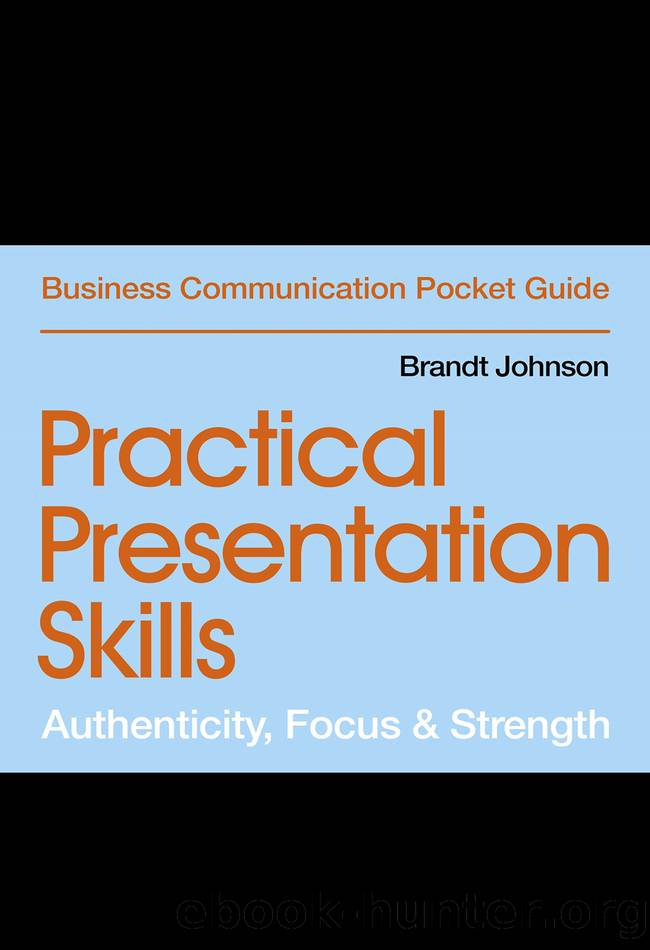Practical Presentation Skills by Brandt Johnson

Author:Brandt Johnson
Language: eng
Format: epub
Publisher: Quercus
Published: 2019-06-15T00:00:00+00:00
Chapter 5
Voice
The way you sound when you speak can bring your words to life—or sap them of their power.
5.1 Warming Up Your Voice
As with the rest of your body, your voice will function optimally when it has been prepared for its task. For example, humming scales and drinking some water before your talk can help you sound your best. Whatever warm-up technique you use, make sure your voice is ready for action before your talk begins.
5.2 Projection, Articulation, and Pitch
You need to speak loudly and clearly enough that your audience—even people in the farthest corner of the room—can easily hear and understand what you are saying. You should also speak at whatever pitch is naturally expressive for you.
We all have a limited capacity for work. The more your listeners have to strain to get your message into their brains, the less energy they have left over to consider it once it’s there.
Help make it easy for your audience to receive your ideas by projecting your voice fully and articulating your words with precision.
This will also suggest that what you are saying matters, that you believe it, and that you care enough about it to put some effort into making sure your listeners get it.
The focus of such a delivery is outward. You are launching your message into the room to land squarely with each listener, rather than just letting it dribble out of your mouth.
Projecting your voice also sends more of your personality into the room and more fully shows your relationship to the content.
A strong voice conveys confidence. Speaking too softly or mumbling can suggest uncertainty or timidity and will undercut the strength of a presentation. If you’re not sure a word or phrase is worth saying, don’t say it. If it is worth saying, say it like you mean it.
It’s a very common vocal pattern to have volume trail off at the end of a sentence, including at the very end of a presentation. But the words at the end of a sentence still deserve to be heard, unless you decide otherwise, in which case end the sentence earlier.
Some speakers let their voices sag into a grumbly lower register out of laziness or habit. Others force their voices lower in an effort to sound more professional. Either way, these speakers’ voices lose energy and expressiveness. Support your voice at its natural pitch, so you can express yourself fully and freely.
If you are using a microphone, keep in mind that while the microphone may add decibels, it cannot give your voice vitality or personality. You need to bring that yourself.
Notes from the Workplace
Fear of Being Too Loud
I have encountered countless people over the years who were afraid of being too loud, but barely any who actually were.
Frequently in my workshops, soft-spoken people stretch themselves, against every instinct, to raise their voices. They can feel embarrassed after doing this, convinced that they were yelling. When this happens, the rest of the group nearly always chimes in to say no, it
Download
This site does not store any files on its server. We only index and link to content provided by other sites. Please contact the content providers to delete copyright contents if any and email us, we'll remove relevant links or contents immediately.
Periodization Training for Sports by Tudor Bompa(7328)
The MacArthur Bible Commentary by John MacArthur(4236)
The Body: A Guide for Occupants by Bill Bryson(3800)
The Sports Rules Book by Human Kinetics(3588)
What It Really Takes to Get Into Ivy League and Other Highly Selective Colleges by Hughes Chuck(3220)
Marijuana Grower's Handbook by Ed Rosenthal(3118)
The Sprouting Book by Ann Wigmore(3052)
Salt, Fat, Acid, Heat: Mastering the Elements of Good Cooking by Nosrat Samin(2658)
The Martian by Andy Weir(2610)
Classic by Mary Berry(2501)
The Bread Bible by Rose Levy Beranbaum(2472)
Harry Potter 4 - Harry Potter and The Goblet of Fire by J.K.Rowling(2416)
Sapiens and Homo Deus by Yuval Noah Harari(2414)
The Marketing Plan Handbook: Develop Big-Picture Marketing Plans for Pennies on the Dollar by Robert W. Bly(2413)
Martha Stewart's Baking Handbook by Martha Stewart(2331)
50 Economics Classics by Tom Butler-Bowdon(2066)
Screenplay: The Foundations of Screenwriting by Syd Field(2057)
The Cambridge Grammar Of The English Language by Rodney Huddleston Geoffrey K. Pullum(2046)
The Plant Paradox by Dr. Steven R. Gundry M.D(2038)
